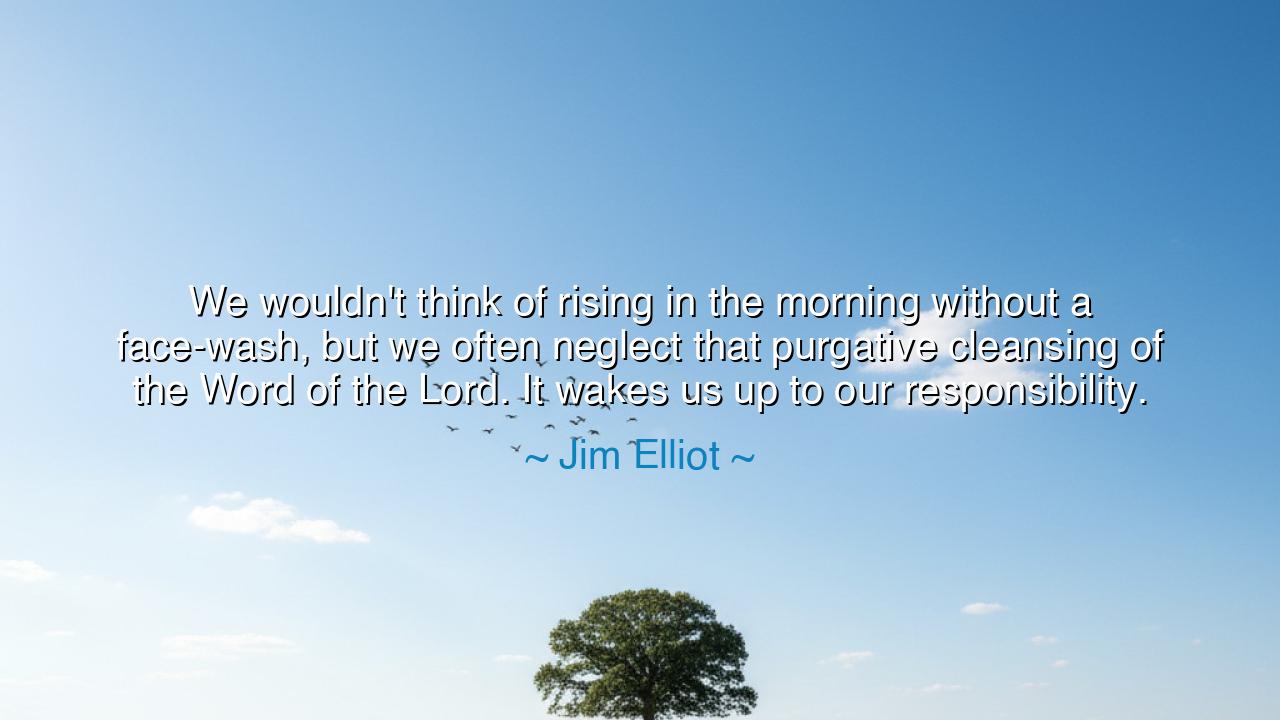
We wouldn't think of rising in the morning without a face-wash
We wouldn't think of rising in the morning without a face-wash, but we often neglect that purgative cleansing of the Word of the Lord. It wakes us up to our responsibility.






The words of Jim Elliot—“We wouldn’t think of rising in the morning without a face-wash, but we often neglect that purgative cleansing of the Word of the Lord. It wakes us up to our responsibility”—are a summons from one who walked with fire in his soul. He compares the washing of the body with the washing of the spirit, teaching that while men are diligent to cleanse the dust of sleep from their eyes, they too often leave their souls caked with the grime of neglect. His imagery is simple, yet thunderous, reminding us that spiritual filth, unlike physical dirt, is invisible to the careless but deadly to the soul.
To Elliot, the Word of the Lord is more than ink upon paper; it is living water, flowing from eternity to awaken mortal men to their responsibility. Just as the body stirs with refreshment after water touches the skin, so does the spirit rise when Scripture is poured upon it. To neglect this purgative cleansing is to stumble through the day burdened, unprepared, blind to the duties heaven has set upon our shoulders. Without it, man is like a soldier who marches to battle but forgets his armor.
The meaning of this teaching grows sharper when viewed through Elliot’s own life. He was a missionary who gave his years and finally his blood to bring the light of the Gospel to the Huaorani tribe of Ecuador. His mornings were not only filled with the washing of his body, but with the washing of the Word. In that daily discipline, he drew strength to face the savage wilderness, courage to step into danger, and compassion to offer forgiveness even to those who would pierce him with spears. His life, cut short at twenty-eight, is itself a testament: though the body may be slain, the spirit fortified in God endures and inspires generations.
Consider also the example of the desert fathers, those early monks who fled the cities to dwell in solitude. They rose with the dawn not merely to wash their faces but to plunge their souls into Scripture and prayer. For them, this cleansing was no ritual but a fountain of life. In their writings, one hears the same cry as Elliot’s: that man must scrub away pride, fear, and sloth, lest his days be wasted in shadow.
The responsibility Elliot speaks of is not vague; it is the sacred charge to live as vessels of love, truth, and sacrifice. It is to remember that each day is given not for idle wandering but for labor in the vineyard of the Lord. Just as unwashed hands spread disease, an unwashed soul spreads bitterness, selfishness, and despair. But a soul daily cleansed in Scripture shines like polished bronze, reflecting light into a darkened world.
The lesson is plain yet piercing: do not rise from your bed without tending first to your soul. Let the basin of Scripture and prayer be at your bedside as surely as soap and water are at your sink. For if the face is washed but the heart is left unclean, what has truly been prepared for the day?
Practically, let each one establish a morning watch. Before the rush of labor, open the Scriptures and drink deeply. Even a single verse, turned over in the mind like a stone in the river, can smooth the roughness of the heart. Let prayer be the cloth that dries the soul, leaving it fresh and ready for battle. And in the evening, return again for cleansing, lest the dust of the day harden into callousness.
Thus, Elliot’s words are not a rebuke only but a call to heroism. They remind us that the great warriors of faith do not march forth unprepared. They gird themselves with the Word, they cleanse their hearts daily, and they live as men and women awakened to their responsibility. If we follow in this way, our lives too will burn with purpose, shining like torches that guide those who wander in the night.






AAdministratorAdministrator
Welcome, honored guests. Please leave a comment, we will respond soon